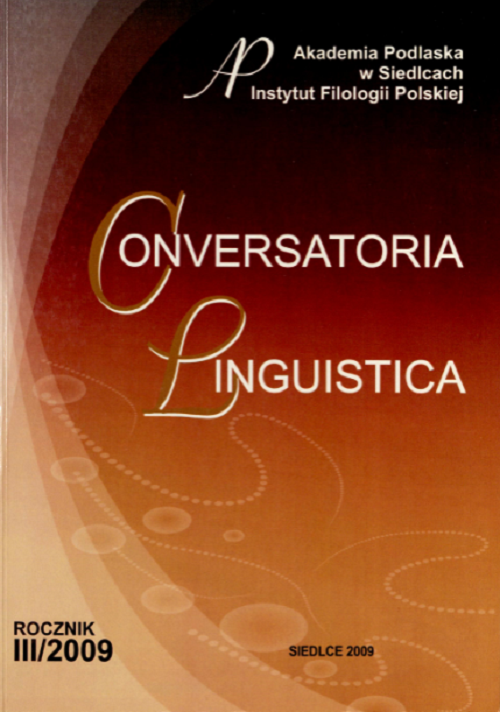Językowe wykładniki pojęć abstrakcyjnych szczęście i miłość w mowie dzieci sześcioletnich
Abstrakt
A child in the acquisition process assimilates different concepts, many of the phenomena is trying to call the same thing. Of particular interest in the development of language is to discover the meanings of words by children, on the one hand, the limited empowerment of language patterns from the environment, on the other – giving the full activity of the child's cognitive, linguistic counterparts and unusually broad mindedness These issues worth a closer look by examining six years old children's understanding of meanings of words and show the children’s definition of names. An important interpretative context for the presented material is a reference to the linguistic skills, perceptual and cognitive young child, thought to certain transactions occurring school on the threshold of maturity. The very definition of consciousness is extremely important from the perspective of linguistics. This refers to the child's understanding that words are merely conventional signs of referential function, which – as a world language elements – subject to the rules of morphology, structural, semantic, and others. Conscious use of language by the child appears at the time of achieving maturity of the child's schooling. Using the method suggested by the description of cognitive linguistics has attempted to describe the language of the world an image of love and happiness of those definitions contained in the token. The study children's language deliberately chose the concept of love and happiness, because they do not correspond to real designata, refer to abstract phenomena associated with the sphere of feelings and emotions. I was interested in how children come to the meaning of these words and what they refer in their definition, and understand their nature and scope. For research purposes, to see a reference to the abstract concepts of extra-linguistic knowledge, abusing a symbolic representation of the drawing. Specific, the importance of abstract concepts studied launched the ability for original thinking and creative language kindergarten, which is an expression of their vulnerability and how to receive the world. Abstract nouns: happiness and love are well known to all 6-year-olds. Children determine its meaning in different ways. For 6-year-olds may be a synonym for happiness, both have toys, and meet good deed, helping the poor and that they are not in an orphanage. The feeling of love preschoolers combined with home and family, sometimes in multi-generational aspect. Language performances of children show a 6-year old invention, creativity, authenticity and originality in defining the meanings of words. The ranges of meaning of these concepts, which allow you to operate children's identification of the most typical features of the data tokens, and a fuller picture for their cultural values to add appeal and linguistic stereotypes, which appeared in the children cited in the world.




